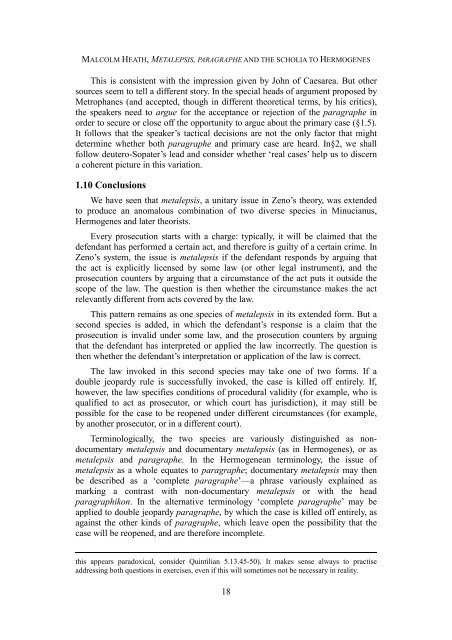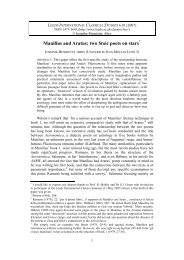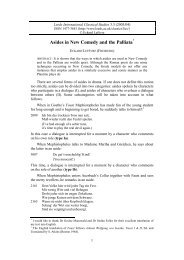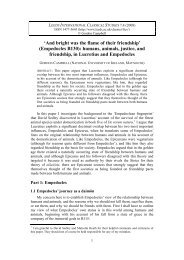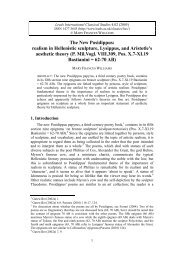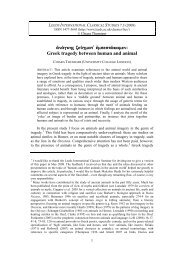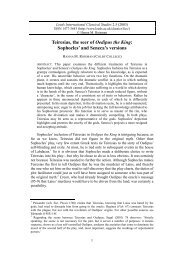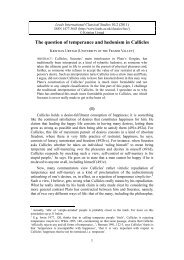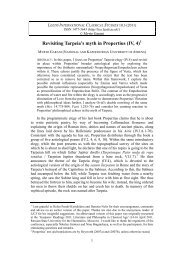Metalepsis, paragraphe and the scholia to Hermogenes - Leeds ...
Metalepsis, paragraphe and the scholia to Hermogenes - Leeds ...
Metalepsis, paragraphe and the scholia to Hermogenes - Leeds ...
You also want an ePaper? Increase the reach of your titles
YUMPU automatically turns print PDFs into web optimized ePapers that Google loves.
MALCOLM HEATH, METALEPSIS, PARAGRAPHE AND THE SCHOLIA TO HERMOGENES<br />
This is consistent with <strong>the</strong> impression given by John of Caesarea. But o<strong>the</strong>r<br />
sources seem <strong>to</strong> tell a different s<strong>to</strong>ry. In <strong>the</strong> special heads of argument proposed by<br />
Metrophanes (<strong>and</strong> accepted, though in different <strong>the</strong>oretical terms, by his critics),<br />
<strong>the</strong> speakers need <strong>to</strong> argue for <strong>the</strong> acceptance or rejection of <strong>the</strong> <strong>paragraphe</strong> in<br />
order <strong>to</strong> secure or close off <strong>the</strong> opportunity <strong>to</strong> argue about <strong>the</strong> primary case (§1.5).<br />
It follows that <strong>the</strong> speaker’s tactical decisions are not <strong>the</strong> only fac<strong>to</strong>r that might<br />
determine whe<strong>the</strong>r both <strong>paragraphe</strong> <strong>and</strong> primary case are heard. In§2, we shall<br />
follow deutero-Sopater’s lead <strong>and</strong> consider whe<strong>the</strong>r ‘real cases’ help us <strong>to</strong> discern<br />
a coherent picture in this variation.<br />
1.10 Conclusions<br />
We have seen that metalepsis, a unitary issue in Zeno’s <strong>the</strong>ory, was extended<br />
<strong>to</strong> produce an anomalous combination of two diverse species in Minucianus,<br />
<strong>Hermogenes</strong> <strong>and</strong> later <strong>the</strong>orists.<br />
Every prosecution starts with a charge: typically, it will be claimed that <strong>the</strong><br />
defendant has performed a certain act, <strong>and</strong> <strong>the</strong>refore is guilty of a certain crime. In<br />
Zeno’s system, <strong>the</strong> issue is metalepsis if <strong>the</strong> defendant responds by arguing that<br />
<strong>the</strong> act is explicitly licensed by some law (or o<strong>the</strong>r legal instrument), <strong>and</strong> <strong>the</strong><br />
prosecution counters by arguing that a circumstance of <strong>the</strong> act puts it outside <strong>the</strong><br />
scope of <strong>the</strong> law. The question is <strong>the</strong>n whe<strong>the</strong>r <strong>the</strong> circumstance makes <strong>the</strong> act<br />
relevantly different from acts covered by <strong>the</strong> law.<br />
This pattern remains as one species of metalepsis in its extended form. But a<br />
second species is added, in which <strong>the</strong> defendant’s response is a claim that <strong>the</strong><br />
prosecution is invalid under some law, <strong>and</strong> <strong>the</strong> prosecution counters by arguing<br />
that <strong>the</strong> defendant has interpreted or applied <strong>the</strong> law incorrectly. The question is<br />
<strong>the</strong>n whe<strong>the</strong>r <strong>the</strong> defendant’s interpretation or application of <strong>the</strong> law is correct.<br />
The law invoked in this second species may take one of two forms. If a<br />
double jeopardy rule is successfully invoked, <strong>the</strong> case is killed off entirely. If,<br />
however, <strong>the</strong> law specifies conditions of procedural validity (for example, who is<br />
qualified <strong>to</strong> act as prosecu<strong>to</strong>r, or which court has jurisdiction), it may still be<br />
possible for <strong>the</strong> case <strong>to</strong> be reopened under different circumstances (for example,<br />
by ano<strong>the</strong>r prosecu<strong>to</strong>r, or in a different court).<br />
Terminologically, <strong>the</strong> two species are variously distinguished as nondocumentary<br />
metalepsis <strong>and</strong> documentary metalepsis (as in <strong>Hermogenes</strong>), or as<br />
metalepsis <strong>and</strong> <strong>paragraphe</strong>. In <strong>the</strong> Hermogenean terminology, <strong>the</strong> issue of<br />
metalepsis as a whole equates <strong>to</strong> <strong>paragraphe</strong>; documentary metalepsis may <strong>the</strong>n<br />
be described as a ‘complete <strong>paragraphe</strong>’—a phrase variously explained as<br />
marking a contrast with non-documentary metalepsis or with <strong>the</strong> head<br />
paragraphikon. In <strong>the</strong> alternative terminology ‘complete <strong>paragraphe</strong>’ may be<br />
applied <strong>to</strong> double jeopardy <strong>paragraphe</strong>, by which <strong>the</strong> case is killed off entirely, as<br />
against <strong>the</strong> o<strong>the</strong>r kinds of <strong>paragraphe</strong>, which leave open <strong>the</strong> possibility that <strong>the</strong><br />
case will be reopened, <strong>and</strong> are <strong>the</strong>refore incomplete.<br />
this appears paradoxical, consider Quintilian 5.13.45-50). It makes sense always <strong>to</strong> practise<br />
addressing both questions in exercises, even if this will sometimes not be necessary in reality.<br />
18


